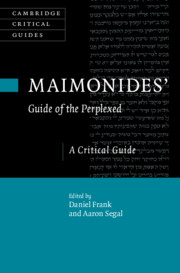Book contents
- Maimonides’ Guide of the Perplexed
- Cambridge Critical Guides
- Maimonides’ Guide of the Perplexed
- Copyright page
- Contents
- Contributors
- Introduction
- Part I Form
- Chapter 1 The Structure and Purpose of the Guide
- Chapter 2 The Guide as Biblical Commentary
- Part II Human Beginnings
- Part III The Creator
- Part IV The Created
- Part V Human Finitude
- Part VI Human Ends
- Bibliography
- Index
- Cambridge Critical Guides
Chapter 2 - The Guide as Biblical Commentary
from Part I - Form
Published online by Cambridge University Press: 18 June 2021
- Maimonides’ Guide of the Perplexed
- Cambridge Critical Guides
- Maimonides’ Guide of the Perplexed
- Copyright page
- Contents
- Contributors
- Introduction
- Part I Form
- Chapter 1 The Structure and Purpose of the Guide
- Chapter 2 The Guide as Biblical Commentary
- Part II Human Beginnings
- Part III The Creator
- Part IV The Created
- Part V Human Finitude
- Part VI Human Ends
- Bibliography
- Index
- Cambridge Critical Guides
Summary
Maimonides never wrote a commentary on the Hebrew Bible or on any part thereof. That literary choice is belied by the influential legacy of Maimonides’ biblical hermeneutics as developed in the Guide. For the Guide is a work that is declaredly about Scripture. This claim merits emphasis: The Guide is first and foremost an exegetical work. In the general introduction, Maimonides writes that the two primary purposes of the Guide are: first, to explain the meaning of certain terms that appear in the Bible; second, to explain the meaning of meshalim, or parables that appear in the Bible. However, in terms of form, the expected approach for an exegetical work, in light of Maimonides’ intellectual background, would have been to compose a commentary on all or part of the Bible. Jewish biblical commentary was a sophisticated art by Maimonides’ time, originating as far back as Saadia Gaon’s (882–942) commentary on the book of Job, which adapted the genre of formal commentary for Hebrew biblical texts. In such formal commentaries, which harken back to models of ancient Greek and medieval Arabic philosophical commentary, three features stand out. One, there is a clear division between text and commentary, between chunks of text (lemmata) and their interpretation, between author and commentator. Two, the commentator follows the order of the text as a structural principle for the commentary. Three, the commentary is the product of one interpreter and reflects an individual reading. Often the commentator adds a preface of some sort, whose structure and themes were guided by a number of conventions. Saadia’s commentary features all of these elements, including an extensive introduction. As far as Greek commentaries on the philosophical-scientific canon, it is a matter of some contention whether Maimonides was familiar with commentaries on Aristotle by Alexander of Aphrodisias. We do know that he was familiar with Galen’s commentary on Hippocrates’ aphorisms, in Arabic translation, since he himself authored a commentary on Galen’s commentary.
- Type
- Chapter
- Information
- Maimonides' Guide of the PerplexedA Critical Guide, pp. 29 - 48Publisher: Cambridge University PressPrint publication year: 2021



